Oracle APEX Template Directives allow you to apply client-side directives to control the display and formatting of data that is returned from SQL.
Template Directives can be used on any APEX components that support client-side rendering. These include the Cards Region and Interactive Grid. Look out for the text Supports Template Directives in the APEX Builder help as additional components begin to support them.
The list of directives that can be applied is if, elseif, else, endif, case, when, otherwise, endcase, loop, endloop.
Benefits of APEX Template Directives
- Simplify business logic in SQL, keeping it free of UI logic
- Reduce the risk of Cross-Site Scripting attacks by removing the need to use 'RAW' item substitution syntax, e.g.,
&P1_TAGS!RAW. - Improve performance by reducing the size of the SQL results
Template Directives Example
The goal of this example is to display cards showing people and their address information embedded in a table within each card. Many columns are not required, and we do not want to show data for columns that do not have a value. The screenshot below shows the finished product.
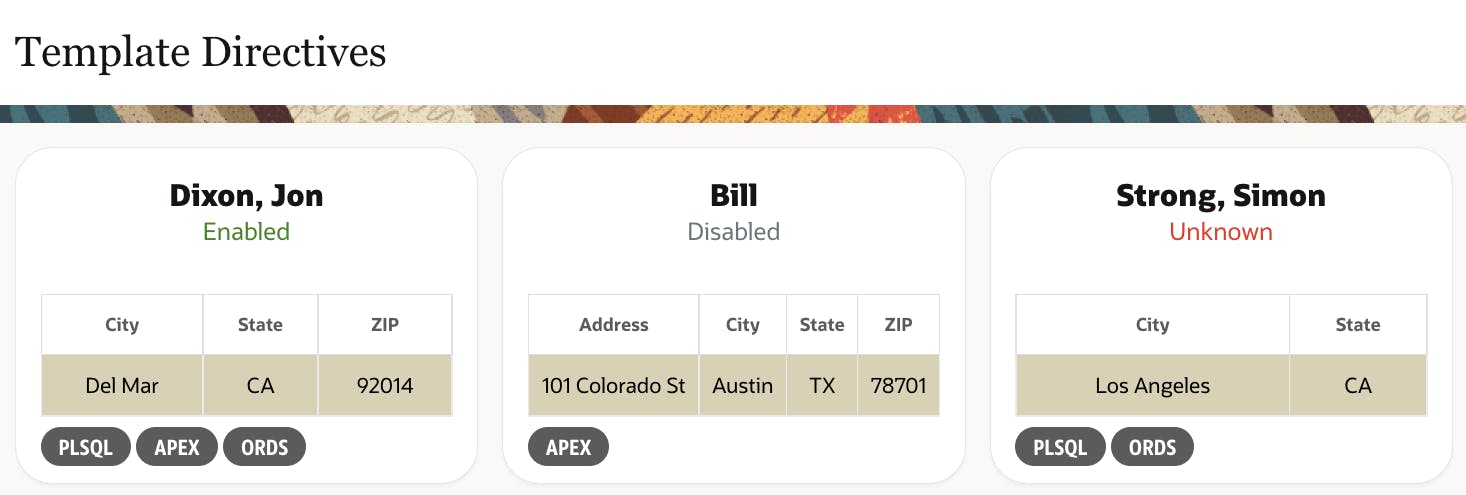
Card Region SQL
The Cards Region is based on the following SQL:
SELECT first_name
, last_name
, address1
, city
, state
, zip
, enabled_flag
, tags
FROM blog_people
Card Region Title
We want to show a comma between the last and first name if the last name is present; otherwise, display the first name. To do this, we need to set the Title Advanced Formatting toggle on and enter the below Template Directive logic.
<h3 class="a-CardView-title">
{if ?LAST_NAME/}&LAST_NAME., &FIRST_NAME.
{else/}&FIRST_NAME.
{endif/}
</h3>
Explanation:
{if ?LAST_NAME/}- if thelast_namecolumn from the SQL is NOT NULL, then show the last name a comma, and then the first name{else/}- show just the first name
In APEX Builder, it looks like this:
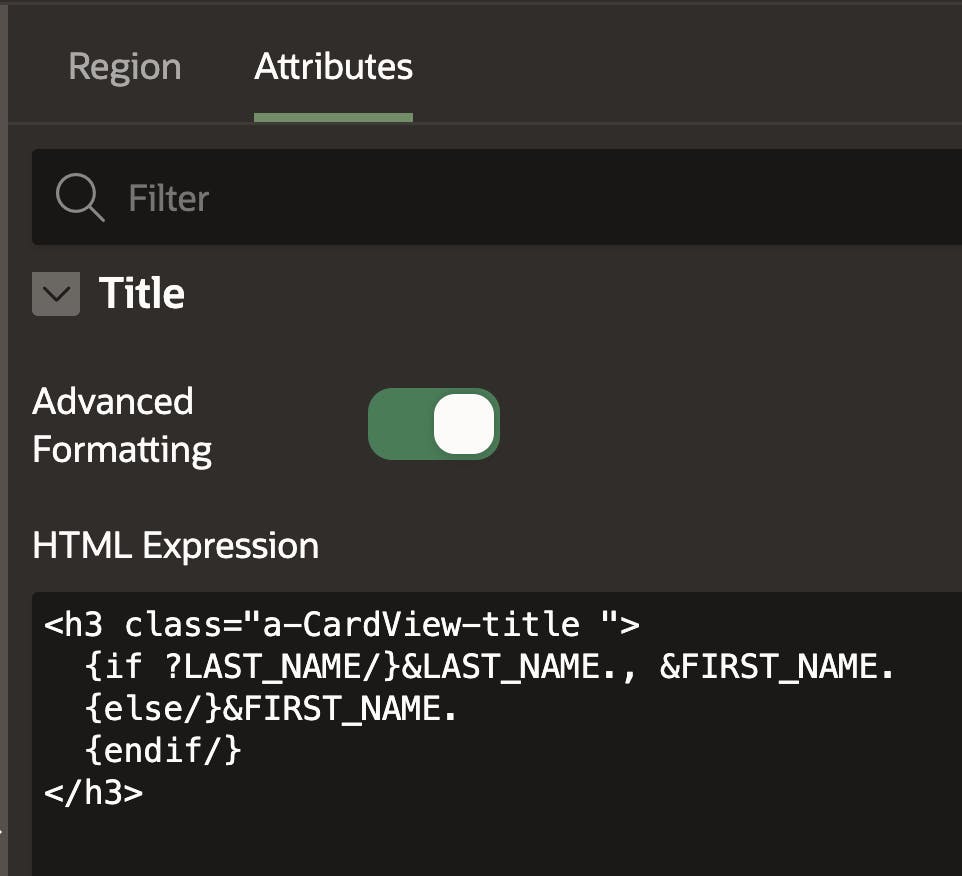
Card Region Sub-Title
We need to display text indicating if the person's status is Enabled, Disabled, or Unknown. For this, we will use a CASE Template Directive.
{case ENABLED_FLAG/}
{when Y/}
<span class="u-success-text">Enabled</span>
{when N/}
<span class="u-color-15-text">Disabled</span>
{otherwise/}
<span class="u-danger-text">Unknown</span>
{endcase/}
Explanation:
- The
{case/}directive is comparing theenabled_flagfrom the SQL statement and returning Enabled for Y, Disabled for N; if it is anything else, then it returns Unknown
The code looks like this in APEX Builder:
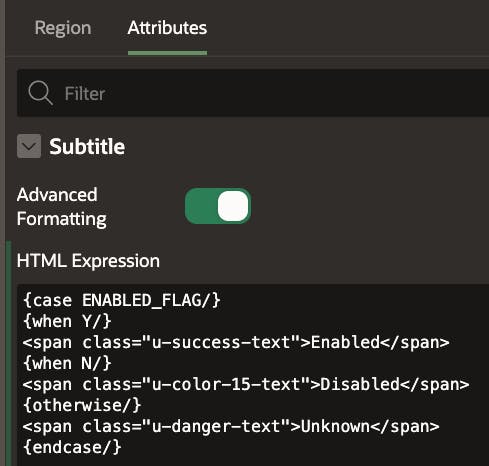
Card Region Body
We need to display an HTML table with the address in the card body. We only want to show columns for parts of the address with a value.
<div class="t-Report t-Report--stretch">
<table class="t-Report-report u-color-21 u-textCenter">
<thead class="t-Report-report u-textCenter">
<tr>
{if ?ADDRESS1/}<th class="t-Report-colHead u-bold">Address</th>{endif/}
{if ?CITY/}<th class="t-Report-colHead u-bold">City</th>{endif/}
{if ?STATE/}<th class="t-Report-colHead u-bold">State</th>{endif/}
{if ?ZIP/}<th class="t-Report-colHead u-bold">ZIP</th>{endif/}
</tr>
</thead>
<tbody>
<tr>
{if ?ADDRESS1/}<td class="t-Report-cell">&ADDRESS1.</td>{endif/}
{if ?CITY/}<td class="t-Report-cell">&CITY.</td>{endif/}
{if ?STATE/}<td class="t-Report-cell">&STATE.</td>{endif/}
{if ?ZIP/}<td class="t-Report-cell">&ZIP.</td>{endif/}
</tr>
</tbody>
</table>
</div>
Explanation:
- The
{if ?COLUMN_NAME/}statements for the table headers and table rows determine if the column is rendered based on whether the column has a value - The ADDRESS1, CITY, STATE, and ZIP columns are referenced from the Region SQL
This is how it looks in APEX Builder:
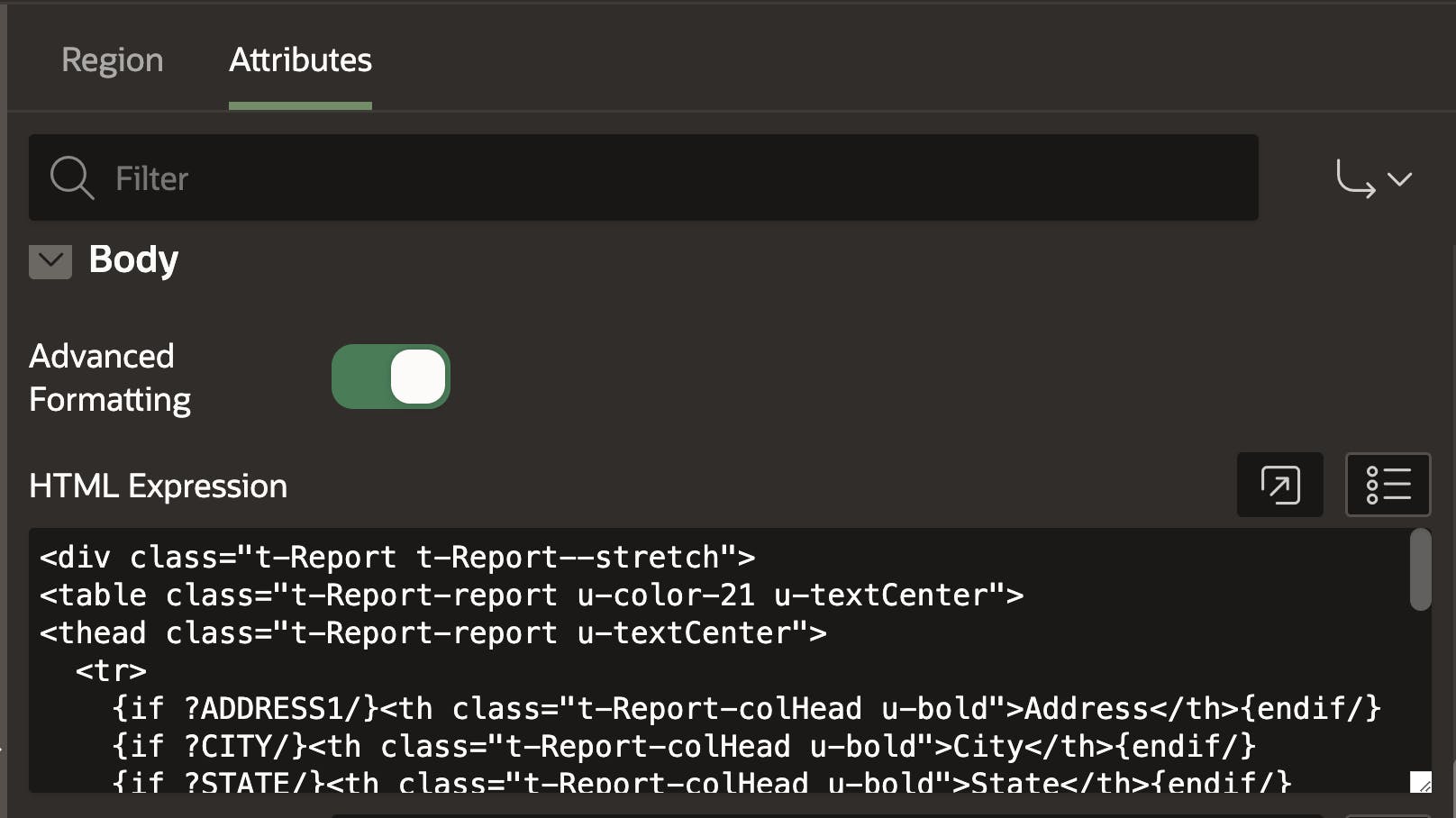
Card Region Secondary-Body
We need to display tags indicating the person's expertise. The tags column in the SQL contains values delimited by a ':' e.g., PLSQL:APEX:ORDS.
{loop ":" TAGS/}
<span class="a-CardView-badge a-CardView-badgeValue">&APEX$ITEM.</span>
{endloop/}
Explanation:
- The
looptemplate directive is looping through the values from thetagcolumn in the SQL. Each value is delimited by a ':' - A specific tag value is referenced within the loop using
&APEX$ITEM. - The
<span></span>HTML tags and the UT classesa-CardView-badgeanda-CardView-badgeValueare used for styling
The code looks like this in APEX Builder:
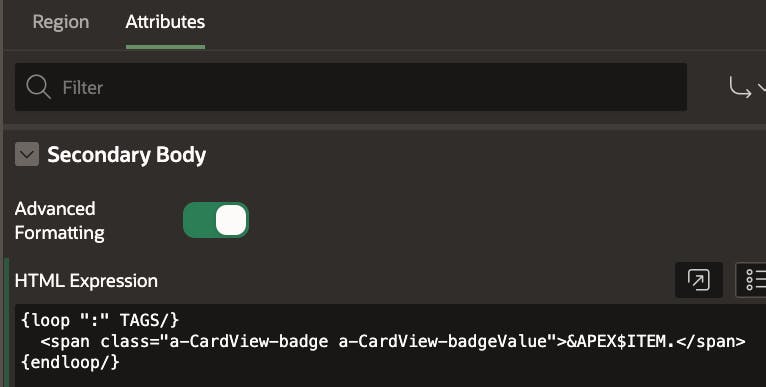
🔗 Read More
- 📖 John Synders Post on APEX Template Directives
- 📖 APEX Documentation
- 🩳 APEX Shorts
- #️⃣ APEX Posts

